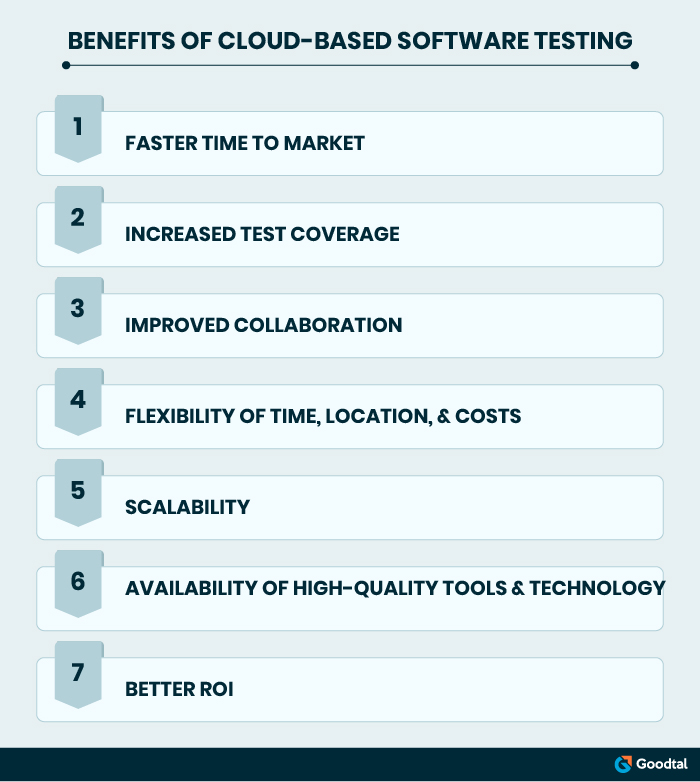
Businesses are aware of how cloud services are transforming various business processes.
Those who are not must read these famous words by Marc Benioff, the CEO of Salesforce:
“The cloud services companies of all sizes…The cloud is for everyone. The cloud is a democracy.”
When we say, Cloud is for everyone, how can we ignore one of the most crucial aspects of software development, i.e., testing?
Software testing is actually one prominent area that is benefitting from the cloud by providing efficient and cost-effective software testing solutions. This blog discusses the different aspects of cloud-based software testing services, including the benefits, challenges, and trends. So, let’s start!
Advantages of Cloud-based Testing
Conventional software testing methods have been in place for decades. With changing trends and technology, these methods have transformed. However, these still suffer from deficiencies that cloud-based testing helps overcome. Let’s understand how.
Scalability
Scalability is a major concern for businesses of all sizes. Small businesses aspire to grow while medium-sized want to compete to sustain while maintaining RoI. In all the cases though, a major concern is to meet the changing needs of upscaling or downscaling. Conventional systems are not easy to configure for these changing needs.
Cloud-based testing allows convenient upscaling or downscaling of testing without hassles as and when required. This also helps optimize resource allocation and use in testing. As a result, cloud-based software testing ensures profitability.
Cost Saving
For small and medium businesses, infrastructure and resources are a concern in terms of costs. They have a lot to spend on and to ensure profitability, they must optimize the expenses in a way that balances costs and benefits. However, on-premise infrastructure is high on costs even for small businesses as the basics are required irrespective of the number of users being served.
Cloud eliminates the need for on-premise hardware and infrastructure and thus, businesses save on capital expenditures and operational costs in testing. As already discussed, the flexibility of scaling also reduces costs to a very large extent when scaling can be done as and when needed.
Accessibility
The pandemic that recently hit the entire world has made us all aware of how work-from-anywhere systems are the need of the hour. As businesses are more and more targeting global clientele, it is important to configure testing so that it is not restricted by time or location.
The biggest advantage of cloud-based testing is that it allows testing from anywhere, even remotely, free from time zone and location constraints. Collaboration has become easier with the cloud and so testing has become more accessible.
Flexibility
Software testing needs vary by the industry, span, and size of businesses. As testing needs are different and ever-changing, businesses need flexible solutions that can accommodate their needs.
Cloud-based software testing comes with flexibility in testing environments, tools, and configurations, enabling businesses to accommodate varied testing needs.
Security
When discussing software testing, how can we ignore security? Cloud-based testing provides the required security measures, compliance certifications, and practices that reduce the risk of data breaches. Cloud-based testing environments are thus more secure.
Speed
As software testing needs are growing in quantity and quality, businesses need to make the systems more efficient to deal with demanding testing needs. Cloud-based testing allows a parallel running of tests, optimizing test cycles, and making testing faster and more efficient. Cloud-based software testing offer high-speed real-time testing capabilities.
Reliability
As the quality concepts have migrated from post-development testing to continuous testing, software testing is important at every stage of software development. However, it is not easy to maintain uninterrupted testing as systems can suffer downtime due to loads and other issues.
Cloud-based software testing comes to the rescue for businesses that can’t manage to maintain reliable on-premise infrastructure. Their best cloud-service providers are experts in their field and they guarantee all the necessary resources that deliver uptime allowing testing to continue without interruption.

Challenges with Cloud-based Testing
Over-optimism is the biggest threat to planning! When it’s about software testing, you can’t be negligent. Awareness of challenges with technology or trends helps businesses cope better and leverage the technology to its best. So, here are the challenges in cloud-based testing for you to prepare for.
Security
We have listed security as one of the benefits of cloud-based testing. Well, it is, when compared to on-premise infrastructure if the businesses do not have enough expertise to manage their systems themselves. And so, cloud-based testing can deliver better security. But, there are two sides to a coin!
Cloud-based testing gets access to sensitive data or applications on the cloud. This makes it important for businesses to implement security practices for data and system protection that ensures only authorized users. In practice, if you have engaged the best cloud-based software testing agencies, they will assure security and you will not have to worry about it.
Compliance
Compliance regulations vary across industries and countries and cloud-based testing service providers must keep themselves updated about the different requirements. There are so many regulations regarding the storage, handling, and processing of sensitive user data and cloud-based testing providers must configure their systems for such compliance.
Integration
If your business is switching over from conventional to cloud-based testing, you will have to work hard to integrate the cloud-based testing environment with your existing systems and processes. It would also require switching over many other existing processes to the cloud.
Connectivity
Cloud-based systems are largely dependent on efficient network connectivity. So, businesses that cannot ensure good network connectivity should first improve this aspect before switching to cloud-based testing.
Cost
There are different cost models for cloud services. Generally for large-scale solutions, the costs are manageable. However, if the business is uncertain of its scaling initially, the cloud services can cost heavily. It also becomes difficult for businesses to estimate how much it would cost for a flexible costing plan that depends on usage. So, it can become difficult to budget for such unforeseen expenses.
Vendor Limitations
There are a large number of vendors offering cloud services. They offer different plans, pricing, infrastructure, tools, and technologies. One challenge is to select the vendor that best matches your needs, and the next is to ensure that you are selecting competent pricing services and not paying an unreasonably high price for a plan customized to your needs.
Skill Deficiency
Cloud-based testing differs from conventional and so it will require specialists who have expertise with the tools and techniques specific to the cloud. The demand for such specialists is high now and availability is not. However, more and more testing specialists are now realizing the need for such skills and acquiring knowledge and skills to adapt to cloud-based testing.
Experienced cloud-based software testing companies are still a plus, as they will ensure results for you without wasting time on training or trial-and-error.
Trends in Cloud-based Software Testing
I am sure you are now convinced that you need cloud-based software testing. And, you have also started planning for the challenges that you will need to overcome if you are opting for software testing on Cloud. But, without the knowledge of these current trends in cloud-based software testing, you won’t get the best results from your endeavors.
Tools & Technology
The best software testing companies are leveraging the most popular tools and technology in software testing, including, Selenium, Microsoft Test Manager, Apache JMeter, etc.
Suggested Reading: 3 Best Tools for Software Testing & Quality Assurance
DevOps Integration
DevOps practices are now a significant part of effective software development. Cloud-based testing is increasingly integrating DevOps practices to enable continuous testing and delivery of applications that perform in the market over those of the competitors.
AI & ML in Testing
Experts in software testing are increasingly using Artificial Intelligence and Machine Learning in cloud-based software testing to automate test case generation, enhance test coverage, and improve test accuracy.
Test Environment Management
Businesses can easily create, manage, and share testing environments across teams with cloud-based testing. This helps in streamlining testing across the whole project.
Test Data Management
Through cloud-based solutions, businesses can generate and manage test data for their applications.
Shift-left Testing
As we all know, software testing is now a part of the entire software development life cycle, starting from the beginning to the end. This shift-left is made easy using cloud-based testing. Earlier it wasn’t easy to test at different stages and processes of the cycle in a unified and optimized manner without affecting their flow or maintaining uniformity and continuity.
Suggested Reading: Are You Keeping Up With the Emerging Trends in Software Testing?
Wrapping Up!
Owing to the tough competition, and to offer high-quality products, businesses must maximize their software testing efficiency with cloud-based testing. As the demand for faster and more efficient software development increases, cloud-based software testing is almost compulsory to provide reliable and scalable testing solutions.
Cloud-based software testing helps businesses achieve higher efficiency by eliminating the need for on-premise hardware infrastructure. It further reduces the time and effort that are generally required with non-cloud testing environments.
Cloud-based testing offers flexibility, agility, and scalability as and when required with changing needs.
Businesses can avail of a wide range of testing tools in cloud-based testing mode, and these models offer pay-per-use and pay-for-what-you-use pricing options. When we evaluate long-term impacts, cloud-based software testing is cost-effective and can help businesses eliminate a whole range of software testing challenges that can crop in with changing testing needs.
